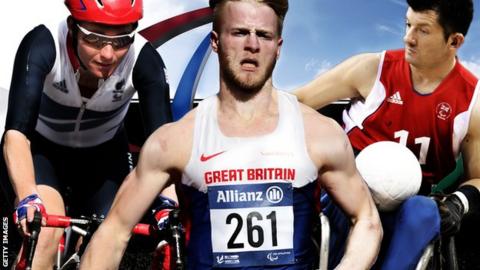
Find out more about the 23 sports in which athletes will be competing for medals at the 2016 Paralympic Games in Rio de Janeiro.
Archery: In Paralympic archery, archers compete in two classes – Open and W1 – and there are two bows used, compound and recurve. John Walker and Jo Frith are GB hopefuls in the compound W1 competition.
Athletics: Athletics is one of only two sports at the Paralympics, along with swimming, which caters for competitors from all physical impairments groups, visual impairments and those with a learning disability.
Boccia: The sport is played indoors on a court similar in size to badminton with players positioned at one end. Both sides have six balls – one side has red balls, the other blue balls and the aim of the game is to get your balls closer to the white target ball – the jack – than your opponent.
Canoeing: Making its debut at the Paralympics, athletes paddle 200 metres in lanes in a kayak, which is propelled by a double-blade paddle. GB and Australia are the only two teams with a full quota of six boats taking part.
Cycling: Cycling at the Paralympics includes both track and road cycling. Track cyclists ride either tandem bicycles or bicycles, while road cyclists compete on handcycles, tricycles, tandem bicycles or bicycles. Dame Sarah Storey, who won four golds for GB at London 2012, has been selected for her seventh Games.
Equestrian: Equestrian events at the Paralympics consist solely of dressage competition, with riders divided into five grades. Britain has led the way since the sport made its debut in Atlanta in 1996, winning five golds at London 2012.
Football 5-a-side: The game is played using a small ball with a bell inside that makes a noise as it moves to aid the players in their movements. The four outfield players must all wear eyeshades to ensure fair play as some players may be partially sighted.
Football 7-a-side: Football 7-a-side is for players who have cerebral palsy or an acquired brain injury. Some of the players in GB’s team used to play for academies related to Premier League football clubs before their respective injuries.
Goalball: A sport for athletes with visual impairments. All players on the court must be blindfolded and the aim is to roll or throw the ball into the opponents’ goal as many times as possible within two halves of 12 minutes.
Judo: Judo at the Paralympics is only open to athletes with a visual impairment. Each competition is based on weight divisions, with seven for men and six for women. The men’s contests take place over a maximum of five minutes, with four-minute contests for women.
Powerlifting: There are 10 different weight categories for both men and women. Athletes are classified by bodyweight alone, which means those with different impairments compete for the same medals.
Rowing: There are four events on the Paralympic rowing programme, raced over 1,000m, with competitors taking part in heats and repechages before going on to contest the finals.
Sailing: There will be three boat classes competed for in Rio – the single-handed 2.4mR, the Skud 18, which features two sailors – at least one must be female – and the Sonar class, which has three sailors on board. The sport’s classification system is based on four factors – stability, hand function, mobility and vision.
Sitting volleyball: The net is lowered to ground level as the players hit the ball over the net sitting down. For a hit to be legal, all players must keep their pelvis in contact with the floor and unlike Olympic volleyball, blocking of the serve is allowed.
Shooting: Both rifle and pistol events are contested at the Paralympics. Australian shooter Libby Kosmala will be representing her country at a 13th Games in Rio at the age of 74.
Swimming: Races take place in a standard 50m pool in the freestyle, backstroke, breaststroke and butterfly disciplines over distances which range from 50m to 400m. UK Sport has given GB’s swimmers a target of between 35 and 45 medals in Rio.
Table tennis: A match is played over the best of five sets, with each won by the first player to reach 11 points. If the score in a set reaches 10-10, a player must establish a two-point lead to win it.
Triathlon: Triathlon will be making its Paralympic debut in Rio and the event will see athletes compete in three disciplines: 750m of swimming, 20km of cycling, followed by a 5km run. For the cycling section of the race, athletes may use a tandem bicycle, handcycle or bicycle, while a wheelchair may be used for the final 5km run to the finish line.
Wheelchair basketball: Wheelchair basketball has been one of the mainstays of the Paralympics since the first Games in Rome in 1960. The GB men are hoping to take home a medal; they finished fourth at London 2012 but won three successive European titles in 2011, 2013 and 2015.
Wheelchair fencing: Wheelchair fencing has three disciplines depending on the type of sword used: the foil, the epee and the sabre. Bouts in the first round of the competition are the best of nine hits and the direct competitors are then promoted to a direct elimination where bouts are awarded to the first to reach 15 hits.
Wheelchair rugby: Played indoors on a regulation-size basketball court, wheelchair rugby features mixed teams of men and women playing matches of four eight-minute quarters. Contact between wheelchairs forms an integral part of the game, although making physical contact with an opponent leads to penalisation.
Wheelchair tennis: Wheelchair tennis is broadly similar to the running game with a few important differences, including players being allowed to bounce the ball twice. Gordon Reid, the inaugural Wimbledon men’s singles champion, will be aiming for a medal in the singles as well as the doubles with team-mate Alfie Hewett, who he shared the doubles title with at SW19 in July.



